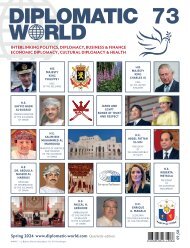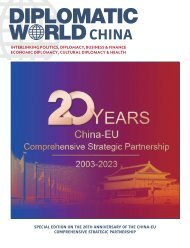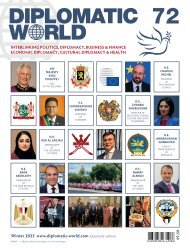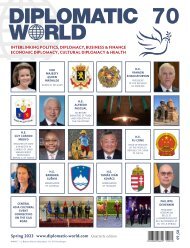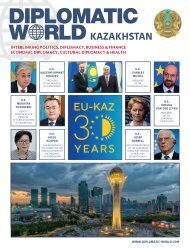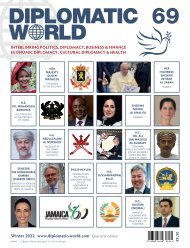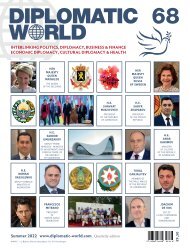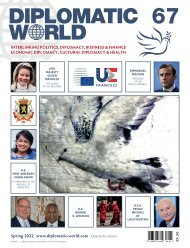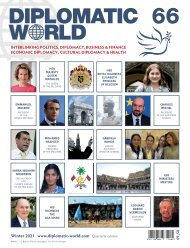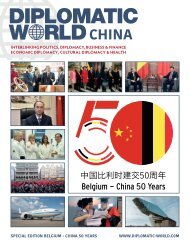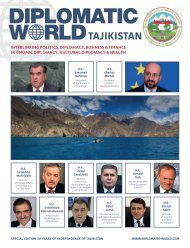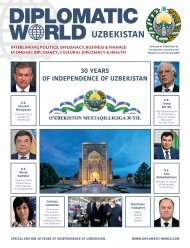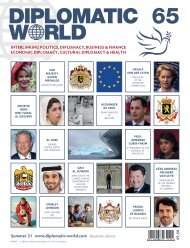Diplomatic World 67
Create successful ePaper yourself
Turn your PDF publications into a flip-book with our unique Google optimized e-Paper software.
EUROPE:<br />
A LOOK BEHIND THE SCENES<br />
“CRISES ARE THE GREAT UNIFIER”<br />
JEAN MONNET, FOUNDING FATHER OF THE EU<br />
tion process, with its roots in the aftermath of a major crisis.<br />
Again, COVID-19 can have this effect. The next generation<br />
project is an unprecedented injection into the real economy. The<br />
financing through European loans would never have been possible<br />
without COVID-19. But floating on that intoxication, let us<br />
now celebrate Europe, not for its 65th anniversary, but through a<br />
reflection on the future role of Europe. Europe must be big in big<br />
things, but small in small things.<br />
interested in the European market but do not want to respect the<br />
environmental and social values that go with it.<br />
Values, that is what matters. In the coming decades, values will<br />
be central. They will determine which economies have a future.<br />
America looks enviously at Europe’s socio-economic model in<br />
which poverty alleviation goes hand-in-hand with competitiveness.<br />
China cannot survive as a one-party state where its economy<br />
only flourishes under the yoke of politics.<br />
A lot of books are published on Europe. The book “Europe: a<br />
look behind the scenes”, published in French (l’Europe, vue de<br />
IT WAS IMPOSSIBLE …<br />
CHANGING THE EUROPEAN MINDSET<br />
Europe should be proud of our Europe instead of torpedoing it<br />
“If we continue to build our internal market, we align our economic<br />
policy more closely with monetary policy, we develop a<br />
social policy worthy of the name, then Europe can become the<br />
l’intérieur) and Dutch (Europa, een blik achter de schermen) is<br />
On content, Europe has proven that it can realize what was<br />
again and again. Space policy is a good example here. Europe is<br />
best place in the world for quality of life of the citizens” claims<br />
different on aspects and tone.<br />
considered by a lot of people as impossible. The internal market,<br />
a global player in Earth observation. Europe realized the mon-<br />
the author.<br />
although not fully achieved, has become a feat that many envy.<br />
etary union. Many observers claimed it was impossible and yet<br />
First, it is written by a person on the inside, who is active within<br />
And yes, the process is slow. Rome was not built in a day. And<br />
the Euro has existed for 20 years, survived financial crises and<br />
Or as Henri Malosse, President of the Jean Monnet association<br />
the European institutions at various high-level posts such as<br />
yes, construction errors have been made, such as the decoupling<br />
proved to be more stable than ever.<br />
and former President of the European Economic and Social<br />
chief of staff and special advisor to the EU presidency. This<br />
of monetary and economic policy.<br />
Committee states: “The gap between citizens and the European<br />
explains the title of the book. Secondly, the topic is described<br />
Europe has 500 million consumers, with considerable purchas-<br />
Union today is so deep that it can never be bridged without the<br />
in an exciting way and full of spicy anecdotes but does not<br />
But the European project has proven to be solid, and capable of<br />
ing power and with a much better distribution of income than its<br />
author’s pragmatism and his twelve proposed works.”<br />
lose the rationale behind the proposals. And finally, it describes<br />
navigating through turbulent waters and crises. Moreover, crises<br />
counterparts. Stop thinking of ourselves as the continent where<br />
often appear to act as an accelerator for the European integra-<br />
the sun sets, claims the author; Europe should have the confi-<br />
Barbara Dietrich<br />
an original vision of what the role of Europe should be within<br />
dence to impose its values on other superpowers who are only<br />
Europe and the world.<br />
FROM PASSION TO PRAGMATISM<br />
Whilst reading the book, you feel the author’s passion for Europe,<br />
but without falling into the pitfall of what is done on a European<br />
level is done better. On the contrary, between Euro-optimists and<br />
Eurosceptics, he refutes a status quo and chooses a third way:<br />
Euro-pragmatism.<br />
Europe is, in the eye of the author, neither a deus ex machina,<br />
nor a scapegoat, but it can make a real difference to the<br />
European Citizen in certain areas. The European citizen is the<br />
real stakeholder of the European (hi)story. Europe must focus on<br />
those areas where it can really make a difference to the Citizen.<br />
Let us be pragmatic. Focus on the large voluminous works. He<br />
recalls the Labors of Hercules. Using analogy, he enumerates the<br />
twelve works that should be the twelve priorities for Europe.<br />
At the same time, he clearly identifies what Europe should no<br />
longer do. From that point of view, he pleads for a lean and mean<br />
structure claiming that the European institutions have been victim<br />
of what the German sociologist Max Weber calls the inflation<br />
of bureaucracy, with a mushrooming of services and external<br />
agencies. A reshaping is hence necessary, and the best way to<br />
reconnect with the European citizens.<br />
152 153<br />
Photo: Istock




